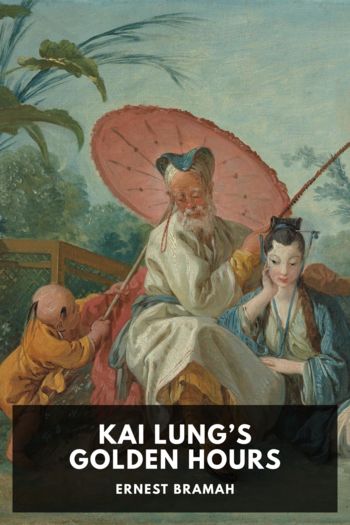Kai Lung’s Golden Hours - Ernest Bramah (the reading strategies book .TXT) 📗

- Author: Ernest Bramah
Book online «Kai Lung’s Golden Hours - Ernest Bramah (the reading strategies book .TXT) 📗». Author Ernest Bramah
To Ning, however, standing on a grassy space on the edge of a flowing river, such thoughts do not extend. He is now a little hairy man of gnarled appearance, and his skin of a colour and texture like a ripe loquat. As he stands there, something in the outline of the vista stirs the retentive tablets of his mind: it was on this spot that he first encountered Hia, and from that involvement began the cycle of his unending ill.
As he stood thus, implicated with his own inner emotions, a figure emerged from the river at its nearest point and, crossing the intervening sward, approached. He had the aspect of being a young man of high and dignified manner, and walked with the air of one accustomed to a silk umbrella, but when Ning looked more closely, to see by his insignia what amount of reverence he should pay, he discovered that the youth was destitute of the meagrest garment.
“Rise, venerable,” said the stranger affably, for Ning had prostrated himself as being more prudent in the circumstances. “The one before you is only Tian, of obscure birth, and himself of no particular merit or attainment. You, doubtless, are of considerably more honourable lineage?”
“Far from that being the case,” replied Ning, “the one who speaks bears now the commonplace name of Lieu, and is branded with the brand of Sun Wei. Formerly, indeed, he was a god, moving in the Upper Space and known to the devout as Ning, but now deposed by treachery.”
“Unless the subject is one that has painful associations,” remarked Tian considerately, “it is one on which this person would willingly learn somewhat deeper. What, in short, are the various differences existing between gods and men?”
“The gods are gods; men are men,” replied Ning. “There is no other difference.”
“Yet why do not the gods now exert their strength and raise from your present admittedly inferior position one who is of their band?”
“Behind their barrier the gods laugh at all men. How much more, then, is their gravity removed at the sight of one of themselves who has fallen lower than mankind?”
“Your plight would certainly seem to be an ill-destined one,” admitted Tian, “for, as the Verses say: ‘Gold sinks deeper than dross.’ Is there anything that an ordinary person can do to alleviate your subjection?”
“The offer is a gracious one,” replied Ning, “and such an occasion undoubtedly exists. Some time ago a pearl of unusual size and lustre slipped from its setting about this spot. I have looked for it in vain, but your acuter eyes, perchance—”
Thus urged, the youth Tian searched the ground, but to no avail. Then chancing to look upwards, he exclaimed:
“Among the higher branches of the tallest bamboo there is an ancient phoenix nest, and concealed within its wall is a pearl such as you describe.”
“That manifestly is what I seek,” said Ning. “But it might as well be at the bottom of its native sea, for no ladder could reach to such a height nor would the slender branch support a living form.”
“Yet the emergency is one easily disposed of.” With these opportune words the amiable person rose from the ground without any appearance of effort or conscious movement, and floating upward through the air he procured the jewel and restored it to Ning.
When Ning had thus learned that Tian possessed these three attainments which are united in the gods alone—that he could stand naked before others without consciousness of shame, that his eyes were able to penetrate matter impervious to those of ordinary persons, and that he controlled the power of rising through the air unaided—he understood that the one before him was a deity of some degree. He therefore questioned him closely about his history, the various omens connected with his life and the position of the planets at his birth. Finding that these presented no element of conflict, and that, furthermore, the youth’s mother was a slave, formerly known as Hia, Ning declared himself more fully and greeted Tian as his undoubted son.
“The absence of such a relation is the one thing that has pressed heavily against this person’s satisfaction in the past, and the deficiency is now happily removed,” exclaimed Tian. “The distinction of having a deity for a father outweighs even the present admittedly distressing condition in which he reveals himself. His word shall henceforth be my law.”
“The sentiment is a dutiful one,” admitted Ning, “and it is possible that you are now thus discovered in pursuance of some scheme among my more influential accomplices in the Upper Air for restoring to me my former eminence.”
“In so meritorious a cause this person is prepared to immerse himself to any depth,” declared Tian readily. “Nothing but the absence of precise details restrains his hurrying feet.”
“Those will doubtless be communicated to us by means of omens and portents as the requirement becomes more definite. In the meanwhile the first necessity is to enable this person’s nails to grow again; for to present himself thus in the Upper Air would be to cover him with ridicule. When the Emperor Chow-sin endeavoured to pass himself off as a menial by throwing aside his jewelled crown, the rebels who had taken him replied: ‘Omnipotence, you cannot throw away your knees.’ To claim kinship with those Above and at the same time to extend towards them a hand obviously inured to probing among





Comments (0)